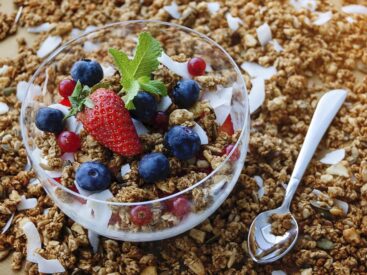Despite the wealth of information and opinions, few people really know what they need to do to improve their health. The results of the most extensive study on the relationship between nutrition and health show that animal protein, by affecting our body’s metabolic processes, is a powerful carcinogen. And eating whole, plant-based foods is best for our kidneys, bones, eyes and brain.
- Keep your cholesterol under control
Blood cholesterol levels rise with increased consumption of meat, milk, eggs, fish, fats, and animal proteins.
Blood cholesterol levels go down with increased consumption of foods and plant-based nutrients, including plant proteins, dietary fiber, cellulose, hemicellulose, soluble carbohydrates, plant-based vitamin B (carotene, B2, B3), legumes, light colored vegetables, fruits, carrots, potatoes and some grains.
- Consume fiber.
Although fiber is not digested by the body, it is important for health. It helps move the water in the body into the intestine to help move food through it. Also, eating enough fiber lowers blood cholesterol levels.
Undigested fiber, like sticky tape, also collects and expels harmful chemicals that enter the intestines and can be carcinogenic. If we don’t consume enough fiber, we are at risk for diseases related to constipation. These diseases include colon cancer, diverticulosis, hemorrhoids and varicose veins.
Dietary fiber is found exclusively in plant foods. Foods rich in fiber are legumes, leafy vegetables, and whole-grain foods like wheat and corn.
3 Eat foods rich in complex carbohydrates
Unfortunately, most people consume extremely high amounts of simple, refined carbohydrates and extremely low amounts of complex carbohydrates.
There is overwhelming scientific evidence that the healthiest diet is one rich in carbohydrates. There is evidence that it helps treat cardiovascular disease, diabetes, prevents many chronic diseases, and there are many examples of it helping with significant weight loss. But it’s not that simple.
At least 99% of the carbohydrates we consume come from fruits, vegetables and grain products. When these foods are consumed in their unprocessed, unrefined and natural form, a large proportion of the carbohydrates are in what is known as complex form.
At the opposite end of the spectrum are heavily processed and refined carbohydrates that are free of fiber, vitamins and minerals. Typical simple carbohydrates are found in foods such as white bread; processed snacks such as crackers and chips made from wholemeal flour; sweets, including pastries and chocolate bars; and soft drinks with a high sugar content. These highly refined carbohydrates come from grain products or sugar-containing plants such as cane or beets. They are easily broken down during digestion into simple carbohydrates, which are digested by the body and supply the blood with sugar, or glucose.
Eat an apple, zucchini or a bowl of brown rice with beans or other vegetables.
- “Absorb can’t be put off” or consume less fat and animal protein
The truth is this: despite any restrictions on calorie intake for short periods of time, our body, through various mechanisms, will eventually decide for itself how many calories to absorb and what to do with them.
When we treat it well by eating the right foods, it knows how to make those calories go not to forming body fat, but to performing more desirable functions, such as keeping the body warm, metabolizing, maintaining and increasing physical activity, or simply getting rid of any excesses. The body uses numerous complex mechanisms to decide how to use – store or burn – calories.
In a high-protein, high-fat diet, calories, instead of being used to warm the body, begin to be stored as body fat (unless significant caloric restriction causes weight loss). Conversely, a low-protein, low-fat diet uses calories to warm the body. Storing more calories as fat and losing less to heat means your body works more efficiently. You’d rather your body work a little less efficiently and turn calories into heat rather than fat, wouldn’t you?
Well, all you need to do is eat less fat and animal protein.
Remember: it takes very little, only 50 kcal a day, to change the process of body fat accumulation in our body and, therefore, our weight.
- Try a plant-based diet
The results of the “Chinese Study” indicate that the lower the proportion of animal foods in the diet, the greater the health benefits-even when that proportion is reduced from 10 to 0% of calories.
A plant-based diet achieves an optimal balance of calories to control weight for two reasons. First, it expends calories to heat the body rather than depositing them as body fat, and it doesn’t take many calories to maintain this effect over a year-long course. Second, a plant-based diet promotes more physical activity. And because body weight is reduced, exercise is easier. The combined effect of diet and exercise leads to weight loss and improves overall health.
Whole foods containing complex carbohydrates, such as unprocessed fruits and vegetables, and whole-grain foods like uncooked brown rice and oatmeal are very helpful. Unprocessed carbohydrates, especially those from fruits and vegetables, have extremely good health benefits.
Foods such as refined flour pasta, sugary cereals, white bread, candy, and soft drinks high in sugar should be avoided whenever possible.
Eating whole plant foods is best for our kidneys, bones, eyes and brain.
Diversify your menu with whole, unrefined plant-based foods.
Food Categories
Give yourself a month to change your daily diet. A month isn’t enough time for all the long-term health benefits of proper nutrition to manifest, but it’s enough time for you to become convinced of the following:
- Plant foods include many wonderful foods that you would otherwise never try. You may not be able to eat everything you want (the urge to eat meat may persist for longer than a month), but you will have plenty of great tasty foods.
- Some people get used to this diet quickly and start to like it. It takes a few months for many to completely rebuild. But almost everyone realizes that it is easier than it seemed.
- You will feel better about yourself. Even after only a month, most begin to feel more alert and usually shed some of the extra weight. Try to get blood tests before you go on the diet, and a month later. Chances are, you will notice a significant improvement even in such a short period of time.
- Most importantly: you will find that it is possible. You may or may not like it, but at least within a month it will become clear: you can do it if you want to. All the health benefits described in this book can be had not only by Tibetan monks and fanatical Spartans, but by you as well.
Eating well not only prevents disease, but also promotes physical and mental health and well-being. Make your choice.



